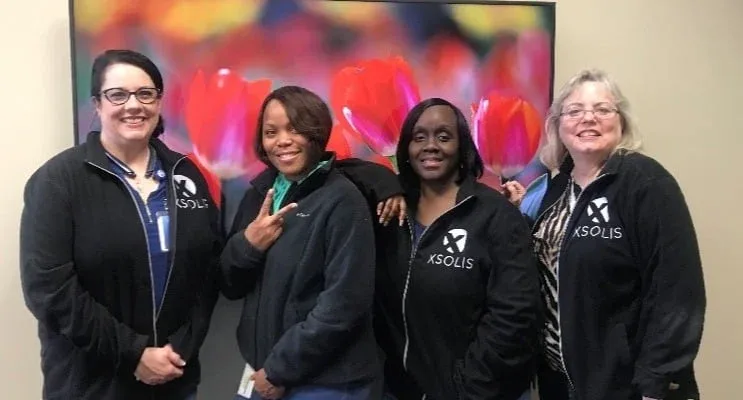Putting the patient first is the common thread between the providers who care for them and the organizations who serve those providers. The denial of patient claims is an ever-present reality for hospitals and can threaten a provider’s ability to serve those patients.
In an effort to uncover a more in-depth perspective on how denials management should be undertaken, we sat down with Xsolis Vice President of Audit Operations Tara Dwyer, who shared not only what the appeals process looks like but how hospitals should be thinking differently about the root causes. Dwyer’s team, which handles denial management serivces for Xsolis clients, are expert navigators of payer claims processes and see the full spectrum of trends and commonalities as they assist hospitals across the nation.
Three Opportunities:
The appeals process has seen an evolution over the years that presents both challenges and opportunities. Historically, frustrations around this process have stemmed from a “lack of documentation in medical records, an inability to review cases in a timely manner due to workload, and communication disconnect between hospital staff and physicians,” Dwyer said. She recommends three reframes for hospital leaders looking to tackle denials differently: know the case and know the team.
Know Your Case:
Looking at cause and effect to tell the patient story is essential in the realm of denials management,” Dwyer continued. The causes represent the clinical indicators and the effect is how those indicators influence the body to accurately describe patient status. As they’re doing this clinical discovery work, Dwyer and her team leverage predictive analytics, specifically Xsolis’ CORTEX, now known as Dragonfly technology platform, to support their work.
When used in conjunction with in-hospital utilization review, CORTEX [Dragonfly] analyzes the clinical merit of patient cases on the front end in order to reduce denials on the back end. The catalyst for this process is the Care Level Score (CLS), which documents and analyzes medical indicators from initial acuity through wellness level at discharge. It produces real-time data analytics by interfacing with the electronic medical record, which allows nurses to summarize, detect, and adapt to changes in patient medical necessity as they occur. Dwyer and her team use CORTEX on the back end to pull together the full, holistic picture of the patient to assess the clinical strength of the appeal case.
So, when is it appropriate for Dwyer’s team to fight for appeal? “You can see the data more clearly on CORTEX [Dragonfly] as opposed to the traditional, manual method,” she explains. “The platform offers clinical data consolidated in one application rather than storing documentation across different places. This way, everything is all in one view,” says Dwyer. “CORTEX can offer up the cliff notes version of the clinical encounter that can be sorted in a multitude of ways and in chronological order.”
Know Your Team:
Through their work, Dwyer’s team takes the administrative burden off the case managers and UM staff at hospitals. If the Denials Management team sees a case to be made for medical necessity, they will fight to have the patient stay labeled as inpatient by the payer. They are not putting incorrect or arbitrary appeals in process, but rather working to do “what’s right” for the patient.
The Denials Management team at XSOLIS comprises appeals nurses with backgrounds in case management and coding, as well as appeals analysts. They are well versed in regulations like the Two-Midnight Rule as well as the ins and outs of commercial payers.
Many cases are denied when they shouldn’t be, so Dwyer’s team reviews cases with other clinicians and escalates them as necessary to governing organizations. For instance, anything that appears to be a short stay can be automatically denied from a claim perspective by payers, so Dwyer’s team re-evaluates these claims to determine if the patient, in fact, met criteria to be labeled as inpatient. Through CORTEX, they establish an understanding of physician patterns and thereby develop a strong rapport with the hospital PAs. Further, they can strengthen client relationships overall by “helping improve efficiency through the use of CORTEX”, Dwyer noted.
Know Your Organization:
Some of the biggest challenges faced by XSOLIS Appeals Nurse Coordinator Terry Mayo and her colleague, Appeals Nurse Coordinator Traci Humphrey, is the disconnect in revenue cycle or billing departments and case management. Humphrey elaborates, “appeals outcomes are improving, but we still see a significant number of denials, particularly in certain regions, due to a lack of engagement or connectivity by UM team members.” They stress that building relationships between departments and creating visibility within workflows is crucial.
So, what is the most rewarding part of the process of working with clients? Mayo tells us that it is “knowing her work is helping hospitals to win.” She enjoys coming to work each day to “fight for the hospitals and their patients by getting denials overturned,” and bolstering their revenue as a result. Humphrey, like Mayo, is intensely passionate about her work and emphasized how important “the relationships are that she builds every day with Xsolis clients and helping patients in any way she can.”
Likewise, Dwyer thrives on the relationships she has built with hospital leaders across the nation and offered simple and meaningful advice for appeals nurses who are doing the tactical, patient-centered work day in and day out: “Apply pressure to payers to review cases in a timely manner and always advocate for the patient first.”
Learn more about Xsolis’ Denials Management Services.
